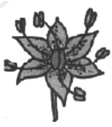A Team of Subject Experts Solutions for Chapter: Morphology of Flowering Plants, Exercise 1: TOPICWISE QUESTIONS
A Team of Subject Experts Biology Solutions for Exercise - A Team of Subject Experts Solutions for Chapter: Morphology of Flowering Plants, Exercise 1: TOPICWISE QUESTIONS
Attempt the practice questions on Chapter 5: Morphology of Flowering Plants, Exercise 1: TOPICWISE QUESTIONS with hints and solutions to strengthen your understanding. Daily Practice Problems (DPP) Unit I: Diversity in the Living World Unit II: Structural Organisation in Plants and Animals NEET solutions are prepared by Experienced Embibe Experts.
Questions from A Team of Subject Experts Solutions for Chapter: Morphology of Flowering Plants, Exercise 1: TOPICWISE QUESTIONS with Hints & Solutions
Select the incorrectly matched pair.
Floral diagram of the family to which Tulip and Gloriosa belong is
Read the following statements and select the correct option.
(a) Colchicine is obtained from members of the family Liliaceae.
(b) Colchicine is used in chromosomal doubling.
Consider the following features (I to III) and select the plant associated with them.
(I) Flowers with bilateral symmetry
(II) Superior ovary
(III) Diadelphous condition of stamens
Select the correct option for the floral formula of the plant which has the following features:
(i) Zygomorphic, bisexual flowers.
(ii) Petals five with vexillary aestivation.
(iii) Ten stamens arranged in diadelphous condition.
(iv) Gynoecium monocarpellary superior ovary.
Which of the following features does not belong to the plants of a particular family to which rest of the features belong?
To which family the following flower is related?

The given floral formula is representable by which group of plant family?

